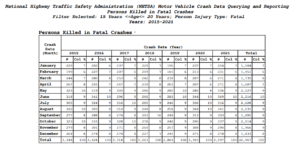Summer Months Usher in Deadliest Period for Teen Drivers
Greater Washington Nonprofit Urges Parental Involvement to Prevent Underage Drinking
Falls Church, VA, May 9– Citing the fact that the summer months usher in that contiguous period (May-August) when the greatest number of U.S. teen traffic deaths occur [i], a Washington-metropolitan area alcohol education group is urging parental involvement to combat both underage drinking and drunk driving this and summer.
The Tysons-based, nonprofit Washington Regional Alcohol Program (WRAP) is providing area parents of teens with Ten Tips for Parents to Prevent Underage Drinking (which are available as a downloadable and or printable pdf). WRAP’s ten annual summer tips, designed to inform Greater Washington parents on how best to deter underage drinking during the dangerous summer months, include:
- Understand the Dangers… Drinking underage not only increases the chances of dependency later on in life but also leads to short and long-term consequences as well as leading to other risky behaviors.
- Know the Law… The District of Columbia, Maryland and Virginia all have zero-tolerance laws making it illegal to consume, possess or purchase alcohol under the age of 21.
- Be a Role Model… Parents should be role models to their teens and make sure their own behaviors are appropriate. Use alcohol moderately, serve as responsible hosts and never drink and drive.
- Know your Liability… In most cases, it is unlawful for parents to allow their children’s friends to consume alcohol in their home. Parents or adults may face criminal charges later on if these same “friends” are involved in a crash.
“In 2020 nearly a dozen teenagers died in U.S. motor vehicle crashes every single day during the summer months (May-August),“ said WRAP President Kurt Erickson. “For too many parents, unfortunately, summer’s unstructured time may also be a deadly time for their teenage children and their friends.”
In 2020, 29-percent of young drivers (ages 15-20 years old) killed in U.S. crashes had been drinking (with a blood alcohol concentration [BAC] level of 0.01 grams/deciliter or higher) according to the National Highway Traffic Safety Administration (NHTSA). That same year, nearly a quarter (24%) young drivers killed in U.S. traffic crashes had a BAC of 0.08 g/dL or higher. [ii]
NHTSA data further shows that while the number of licensed young drivers (15 to 20 years old) in the U.S. decreased by 4.7-percent in 2020, the number of fatalities involving these same young drivers increased and by a double-digit percentage (17%) during this same period. [ii]
In addition, and according to the 2022 Monitoring the Future survey sponsored by the National Institute on Drug Abuse, levels of alcohol use by U.S. 12th, 10th and 8th grade students “significantly increased between 2021 and 2022, returning to pre-pandemic levels” with alcohol, cannabis use and nicotine vaping being the “three substances having the highest levels of use among (U.S.) adolescents.” [iii]
In addition to its tips for parents to deter underage and drunk driving this summer, WRAP also encourages parents to be aware of social networks which their children use. Party promoters often prey on youth via social media sites and by promising a good time and access to alcohol for a fee, according to WRAP.
“Make no mistake about it, parents play an integral role in when and if their children drink alcohol,” said Erickson. “These tips are simply meant to reinforce their efforts to foster a healthy and safe summer for them and their teenage children.”
Having commemorated its 40th year in 2022 after being founded in 1982, the nonprofit [501(c)(3)] Washington Regional Alcohol Program (WRAP) is a coalition of diverse interests using effective education, innovative programs and targeted advocacy to end alcohol-impaired driving and underage drinking in the Washington, DC metro area. Through public education, innovative health education programs and advocacy, WRAP is credited with keeping the metro-Washington area’s alcohol-related traffic deaths historically lower than the national average. WRAP, however, may be best known to area residents via the organization’s popular free safe ride service for would-be drunk drivers, SoberRide®. For more information, visit WRAP’s web site at www.wrap.org.
[i] National Highway Traffic Safety Administration (NHTSA) / Fatality Analysis Reporting System (2023 below)
[ii] NHTSA Traffic Safety Facts: Young Drivers (June 2022, 2020 Data) https://crashstats.nhtsa.dot.gov/Api/Public/ViewPublication/813313
[iii] 2022 Monitoring the Future survey https://monitoringthefuture.org/wp-content/uploads/2022/12/mtf2022.pdf.

